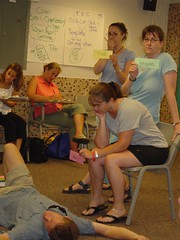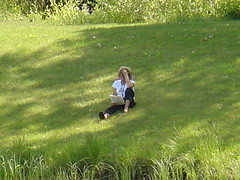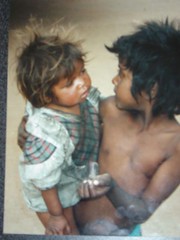Wednesday, July 27, 2005
Podcast #15 -- Craig Moyer
Sunday, July 24, 2005
Who qualifies?
Sunday, July 17, 2005
Vacation
Saturday, July 16, 2005
Podcast #12 -- Kim Penn
Kim Penn is today's podcaster. She's perhaps the most polite of our group -- I especially love the "thank you's" at the end of each of her pieces. I know that you'll enjoy her writing, too.
Thursday, July 14, 2005
Podcast Vacation
Chillin' in Telluride
M.
P.S. Julie's still posting on the E-Anthology. Check out her rewrite of Laundry Day.
Wednesday, July 13, 2005
This'll only take a second
Friday, July 08, 2005
Podcast #13 -- Rebecca Fox
Thursday, July 07, 2005
Podcast #11 -- Julie Meiklejohn
Poetry in your classroom
A little slow, but eventually I get there...
Good Questions
Knowledge is something that many students think is a compiled mass of stuff that they need to memorize and fill their heads with. It is not necessarily something they feel they need to understand, expand upon, or comprehend. To many students, it is finished.
Science Magazine has compiled a list of 100 questions that science needs to solve. 100 big questions for this century. Interesting. What else is interesting is this essay they have posted In Praise of Hard Questions.
The essay explains how hard questions, many of which seem unanswerable push us forward. They push us towards novel ways of thinking, new ways of looking at problems, and ask us to stretch what we feel we are capable of. This would be valuable reading for students (if of course I was not enjoying my second day of summer holidays :) ).
As is equally true in classrooms as in a hard science research lab:
"Unsolved mysteries provide science with motivation and direction. Gaps in the road to scientific knowledge are not potholes to be avoided, but opportunities to be exploited.
"Fundamental questions are guideposts; they stimulate people," says 2004 Nobel physics laureate David Gross. "One of the most creative qualities a research scientist can have is the ability to ask the right questions."
Science's greatest advances occur on the frontiers, at the interface between ignorance and knowledge, where the most profound questions are posed. There's no better way to assess the current condition of science than listing the questions that science cannot answer. "Science," Gross declares, "is shaped by ignorance."
The idea of classrooms being learning communities, where students are pushing the boundaries of their knowledge, and of knowledge in general is one we need to pursue. Classrooms as places of research, of dialogue, of knowledge creation is powerful, gives education relevance, and moves ideas to centre stage in classrooms.
It would be interesting to compile a list in a classroom with students of what they feel the gaps are in their knowledge are. Would they feel there are gaps, or does schooling knock ideas of creativity and curiousity out of them?
NWP E-anthology Participant Survey
UPDATE: Two days came and went. If you'd still like to participate in the survey, log onto the e-Anthology.
Tired

Tired
Originally uploaded by Bud the Teacher.
Tired. But almost home. Hang in there, gang -- two days to go.
Wednesday, July 06, 2005
Sock Puppets
Flicktion
Maybe you can start your own Flickr account (it's free) and write some of your own flicktion. What else are folks doing with ptohos in their classroom?
A Concern
But please. Please. Don't let this blog die.
Many of you are signed up as contributors. Many more of you have expressed an interest. If each of you found the time to make one post or comment every week or two, this blog can stay healthy.
Please. Please. Don't let this blog die.
There are others who aren't in our group who do read this blog. Perhaps they find ideas for their classrooms here. Perhaps they enjoy watching another group at work. For their sake, and ours, please. Please don't let this blog die.
Okay. That's enough groveling. For now.
Podcast #10 -- Rachel Church

Rachel the Podcaster
Originally uploaded by Bud the Teacher.
This is Rachel Church reading a short story for our podcast. She's sitting outside at Tamasag, a retreat center where the CSUWP spent the day before the 4th of July weekend. The sounds of birds and nature combined with her reading voice make for a great podcast.
Enjoy!
Tuesday, July 05, 2005
The Teacher's Voice
Submit. Submit. Submit.The Teacher’s Voice is a small press literary magazine which contains poetry, short stories, and creative nonfiction that reflect the multifaceted and varied American teacher experience. We publish creative writing that ranges from the idiosyncratically personal to the broadly socio-political: work that makes connections between the two gets special consideration. We look for writing that takes risks and is critical without being overly self-indulgent. The American education system has a myriad of problems and some stunning successes that teachers know intimately. Our goal is to provide a literary journal for these very same teachers to creatively communicate their perspectives.
Each fine collectable hardcopy is 8 ½ by 5 ½, 60 pgs., printed on recycled paper, with ivory linen card cover, and saddle-stitched. The bulk of circulation will come through subscriptions, but we plan to place The Teacher's Voice on many independent bookstore and library shelves around the N.Y.C. metropolitan area and other parts of the country.
We are open to all inquiries and are calling for strong poetry especially from teachers. We hope to make The Teacher's Voice the most welcoming literary journal for those committed to education. If you would like to submit work online or by mail, please see our submission guidelines or query:
editor@the-teachers-voice.org.
Grateful appreciation goes out to our subscribers and we trust that more will offer their support by ordering a copy or subscription. Our survival depends on readership support and we ask that readers consider donating an inaugrual year subscription to their local public or school library. Library copies are laminated and reinforced. Such donations will be acknowledged in our Winter 2005 issue.
Blogging Resources for Your Classrooms
Anyway, if you're going to blog with students, which is still a rather gray area in a lot of places, it's probably a good idea to involve your administrators and parents. I'm sure you knew this already, but better safe than sorry. I've got a wiki where there's lots of stuff that might be useful to you in terms of sample policies, permission slips, student activities and other handouts and conversations.
Check through the links and see what's useful. If you need something that you can't find on the wiki, let me know and I'll track it down for you.
Better yet, go ahead and create what you need and then share it with us on the wiki.
More reading
Of course you've got a minute. You're here at the blog, instead of working on all the stuff that's due this week. So you must be done.
Right?
Bad Writing
Monday, July 04, 2005
Podcast #9 -- Nicole Herr

DSC01726
Originally uploaded by Bud the Teacher.
Nicole's poem and this photograph go together. Enjoy them both.
Sunday, July 03, 2005
Poetry Blog
Bud's influence was finally too much for me, and I've created my own poetry blog. I know just enough about what I'm doing to be considered dangerous, but the fun of the NWP E-Anthology and the CSUWP blog convinced me to set one up. Check it out.
Hope everyone's enjoying the four-day weekend. Lots of house cleaning happening in between naps at my casa...
M.
Friday, July 01, 2005
What Will's Learned
Weblogs are disruptive. I think that's what I find most intruiging about this technology is the way in which it changes much of what it touches. Weblogs disrupt the notion that the best way to deliver curriculum (or publish the news, or run a campaign) is the same way we've been doing it for eons. It's not. Weblogs are personal. It doesn't matter what I blog about, I leave a piece of my soul every time I blog because I'm always feeling the reader on the other side of the screen, imagined or not. I'm not just putting words out there; I'm putting a part of myself, and even though I've been doing it for four years now, each post still feels like a risk. Blogging is thinking. I know I say that all the time, but if you're not expending some brain cells when you blog, you're not blogging. Blogs take work. They need to be nurtured. They demand attention. It really is like planting a seed and then consistently tending to its growth. Blogs are not for everyone. Although I wish everyone had a blog, I can understand why many choose not to. Blogs are as flexible as your imagination. I'm still amazed by the different ways teachers are employing this technology in classrooms, and I still don't think we've even begun to realize the potential. Blogs are a risk, but not as much of a risk as some would suggest. Common sense tells us to protect our students and to teach them appropriate use, and by and large, most kids play by the rules. Kids love comments. I know Anne said this as well, but it's so true. And they also think they know what this blog thing is about, which they really don't from an instructional sense. And therefore Teaching blogs to students takes a plan. What do you want to achieve? What can you do with a blog that you can't do some other way? Effective use of Weblogs in the classroom comes when teachers have planned well. Blogs empower students and move control away from teachers. It's something that at first takes a while to get used to, but to not see blogs as expansive is to limit their potential. Parents like blogs, the ones that take an interest, at least. I've learned more about teaching, about communicating, about the world, about technology, about community from blogging than anything else I've done.
